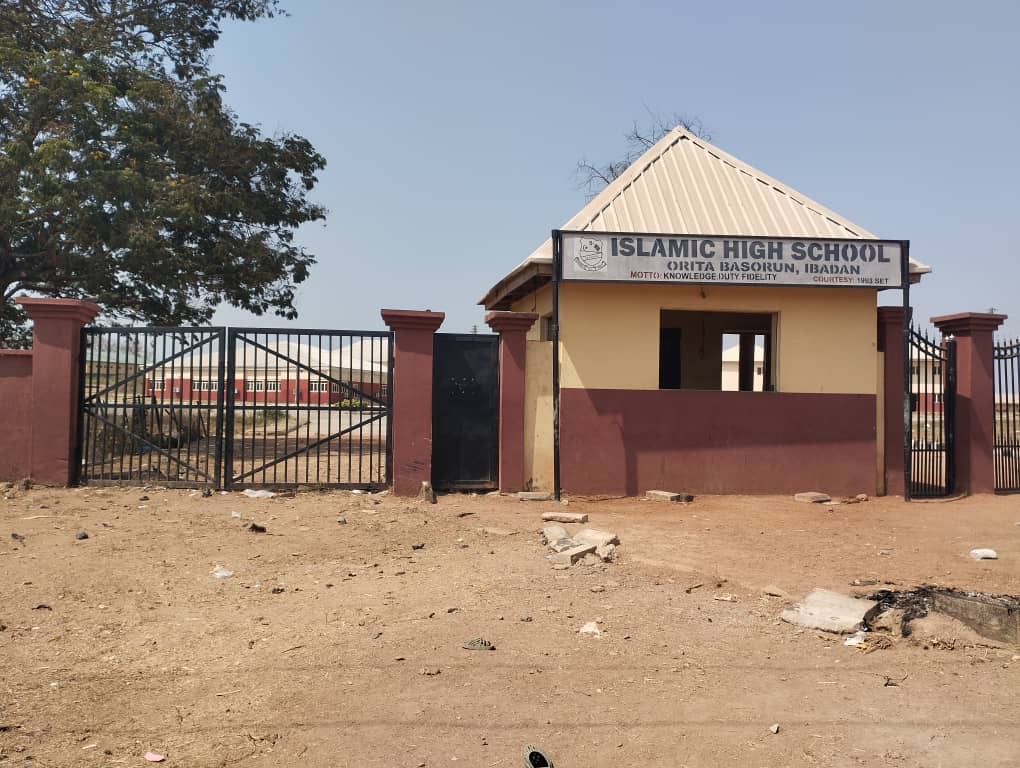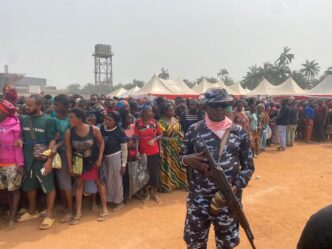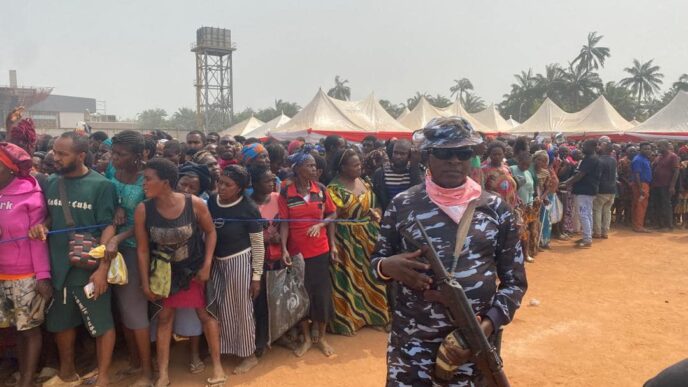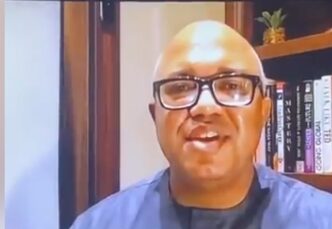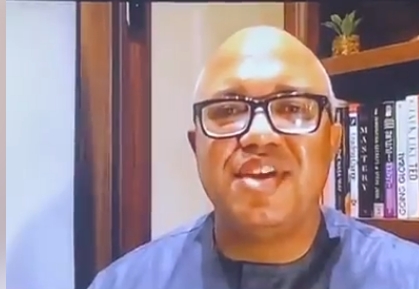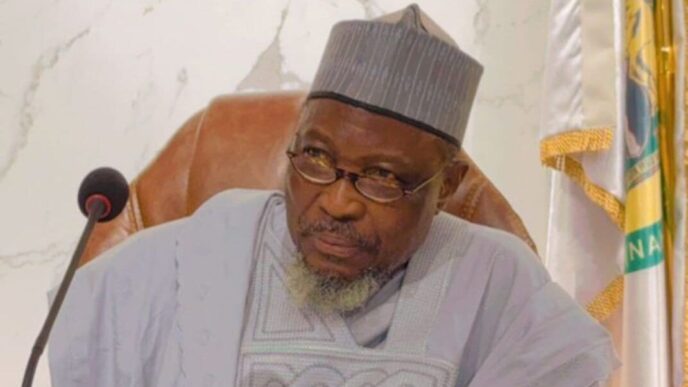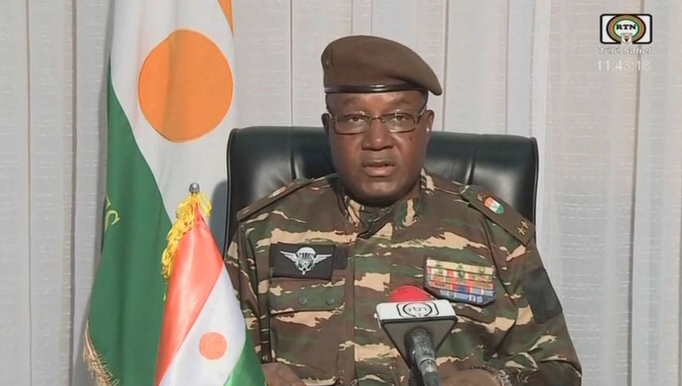Venue of the Ibadan children’s carnival
BY MUKHTAR YA’U MADOBI
The festive season in Nigeria, traditionally is a period of joy and celebration. Unfortunately, this year is being marred by a series of tragic events that underscore the deepening social and economic crisis in the country.
A series of stampedes across the country have resulted in the deaths of over 60 people, including children scrambling for food palliatives, highlighting the severity of hunger, poverty and desperation among Nigerians.
Specifically, 35 people, mostly children, died during a stampede at a carnival in Ibadan, Oyo state, south-west Nigeria. A few days later, 22 people were killed during a stampede in Okija, Anambra state, south-east Nigeria, while participating in the sharing of rice donated by entrepreneur Ernest Obiejesi, popularly known as Obijackson.
Advertisement
Another 10 persons died, and several others were injured on the same day during a stampede at the Holy Trinity Catholic Church in the Maitama District of Abuja.
The tragic stampedes during food distributions reflect the extent of poverty, which continues to push vulnerable citizens into life-threatening situations. As we approach Christmas and New Year, the fear of more tragedies looms, especially with the increasing prevalence of uncoordinated palliative distribution events.
These avoidable tragedies highlight the systemic failures of certain government institutions in formulating effective policies, implementing meaningful economic reforms, and developing robust social welfare programs to address the underlying challenges plaguing our nation.
Advertisement
Concerns have been expressed over President Bola Ahmed Tinubu’s removal of fuel subsidy, increased electricity tariffs, and the floating of the naira that ultimately compounded inflation, making basic necessities of life inaccessible to the average citizen.
Rather than addressing the rising inflation that drives basic commodities out of reach, in his first presidential media chat, Tinubu firmly rejected the idea of imposing price controls to address escalating food prices.
While his stance aligns with free-market principles, it disregards the immediate suffering of millions who cannot afford their next meal.
He said: “I don’t believe in price control. I’m sorry. What we have to do is to keep supplying the market. I believe in the full application of free market economics. Your money will flow easily in and easily out.”
Advertisement
It should be known that hunger has become a weapon in the hands of Nigeria’s elite, enabling them to manipulate and control the impoverished masses. The desperation to secure a meal, from recent cases of stampedes, has turned food palliatives into death traps.
While the president attributes the recent stampedes to poor organisation by the palliative distributors, his remarks fail to acknowledge the broader systemic failures that have created these conditions. The neglect of social safety nets and the absence of sustainable poverty alleviation programmes have left the poor with no choice but to risk their lives for a bag of rice or groceries.
Notwithstanding, the inspector-general of police, Kayode Egbetokun, cautioned against unregulated palliative sharing. But his warnings will mean little without systemic changes that address the root causes of poverty and hunger.
Despite being plagued by scandals under successive ministers, including Sadiya Umar Farouq and Betta Edu, the ministry of humanitarian affairs and poverty alleviation could have potentially averted the tragic stampede for palliatives if its lofty missions and mandates had been properly implemented.
Advertisement
The humanitarian ministry has sadly become a symbol of inefficiency and corruption, further eroding public trust in government interventions. These shortcomings have undermined its ability to address the nation’s growing humanitarian crises, leaving vulnerable populations without the support they desperately need.
National security, as rightly noted, extends far beyond military capabilities and advanced weaponry. True security ensures citizens have access to food, healthcare, education, and economic opportunities. Hunger and poverty pose as much of a threat to national stability as armed insurgency, demanding urgent political will and strategic foresight.
Advertisement
The Office of the National Security Adviser (ONSA), under Nuhu Ribadu, must lead a coordinated and holistic approach to national security. Efforts across critical sectors such as agriculture, economic development, emergency response, and intelligence must be integrated into a strategic framework to protect citizens from socio-economic vulnerabilities. Ending these systemic social disasters requires strong leadership, unwavering political will, and a commitment to poverty alleviation.
The government must prioritise tangible programmes that uplift the masses. This includes expanding access to welfare schemes that guarantee necessities like food, healthcare, and education; investing in skills acquisition and job creation to provide sustainable livelihoods; and establishing transparent, efficient mechanisms for distributing food and essential items to prevent fatal stampedes.
Advertisement
Ministries and agencies tasked with poverty alleviation must undergo a thorough overhaul to eliminate corruption and ensure the efficient delivery of services. Enhancing agricultural production and expanding the value chain are also critical steps toward making food more accessible and affordable for all Nigerians.
While economic reforms are essential for long-term growth, the government must implement measures to mitigate their immediate impact on vulnerable populations. This includes subsidies, tax reliefs, and price stabilization policies to shield the poor from the harshest effects of reforms.
Advertisement
The tragic stampedes and rising death toll are a sobering reminder of the urgent need for systemic reforms. The government must confront the structural inequalities and flawed economic policies that perpetuate hunger and poverty. Weaponising hunger or trivialising the lives lost in the struggle for survival is a betrayal of national values.
To restore hope and dignity to its people, Nigeria must prioritise collective security across economic, social, and political dimensions. The tragedies in Ibadan, Okija, and Abuja should serve as a wake-up call, compelling leaders and citizens alike to demand accountability and advocate for a nation where no one has to risk their life for a bag of rice.
Mukhtar Ya’u Madobi is a research student at the Nigerian Defence Academy (NDA) and the author of National Security Strategy: A Young Writer’s Perspective. He writes on issues related to security and governance from Kano and can be reached at [email protected].
Views expressed by contributors are strictly personal and not of TheCable.
Add a comment
